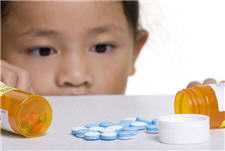For Parents: Young Children and Adverse Drug Events

Young Children and Adverse Drug Events
When someone has been harmed by a medicine, they have had an adverse drug event. To reduce the risk of harm from adverse drug events in young children, parents should:
- Always recap and store medicines out of the reach of children
- Carefully give medicines as directed on the label or as instructed by a physician or pharmacist
- Use prescription and over-the-counter medicines only when needed.
Pre-school age children can be seriously harmed if they get into medicines when no adult is watching
- Finding and eating or drinking medicines on their own, without adult supervision is the #1 cause of emergency visits for adverse drug events among children less than 5 years old. An estimated 53,000 children less than 5 years old are brought to emergency departments each year because of unsupervised ingestions.
Tips for parents:
- Never leave children alone with medicines. If you are giving or taking medicine and you have to do something else, such as answer the phone, take the medicine with you.
- Do not leave medicines out after using them. Store them in medicine cabinets or other childproof cabinets that young children cannot reach.
- When purchasing medicines for young children, check to make sure they are in child-resistant packaging that you are comfortable using.
- Put the poison control number, 1-800-222-1222, on or near every home telephone and save it on your cell phone.
Parents are more likely to make mistakes when giving medicines to infants and toddlers than to older children
- For example, half of the mistakes leading to emergency visits from cough and cold medicines occur when giving medicines to infants and toddlers.
Tips for parents:
- Read all of the information on the package label and follow the directions. Do not give a child medicine more often or in greater amounts than is stated on the package.
- Use only the measuring device (dropper, dosing cup or dosing spoon) that is included with the product. A kitchen teaspoon or tablespoon is not a good measuring device for giving medicines to children. If a measuring device is not included with the product or you do not receive one, purchase one at a pharmacy or ask for one from your pharmacist.
- Check the "active ingredients" in prescription and over-the-counter medicines. Make sure that you do not give your child two medicines that have the same "active ingredient." If you have questions ask your doctor or pharmacist
- If you do not understand the instructions on the label, or how to use the dosing device (dropper, dosing cup, or dosing spoon), do not use the medicine. Talk to your pharmacist or doctor if you have questions or are confused.
Some medicines may not be effective in improving children´s health
- Antibiotics can kill bacteria but not viruses. Most colds, coughs, flu, sore throats, and runny noses are caused by viruses. Taking antibiotics for viral infections will not cure viral infections, keep others from catching the illness, or help your child feel better. Although antibiotics are good drugs for certain types of infections, they are also the type of medicines that cause the most emergency visits for adverse drug events. An estimated 40,000 children are brought to emergency departments each year because of adverse events from antibiotics.
- Cough and cold medicines do not cure the common cold. Although cough and cold medicines may be used to treat the symptoms of the common cold in older children, they should not be used in children less than 4 years old. Too much cough and cold medicine can cause serious harm or even deaths in children.
Tips for parents:
- Do not ask for antibiotics when a doctor says they are not needed.
- If your child is prescribed an antibiotic, make sure they take all the medicine as prescribed, even if they feel better. Do not save antibiotic medicine "for later."
- Do not use cough and cold products in children under 4 years of age unless specifically told to do so by a physician.
- Do not give children medicine that is packaged for adults unless specifically told to do so by a physician.
For More Information
- Tips to Prevent Poisonings , CDC
- OTCsafety.org : Information for Parents , Consumer Healthcare Products Association (CHPA)
- Get Smart: Know When Antibiotics Work , CDC
- Using Over-the-Counter Cough and Cold Products in Children , Food and Drug Administration (FDA)
- My Child Has a Virus, How Can I Help Her Feel Better? American Academy of Pediatrics
- Page last reviewed: September 28, 2010
- Page last updated: October 8, 2010
- Content source:
- Centers for Disease Control and Prevention
- Page maintained by: Office of Associate Director of Communication, Division of Public Affairs



 ShareCompartir
ShareCompartir